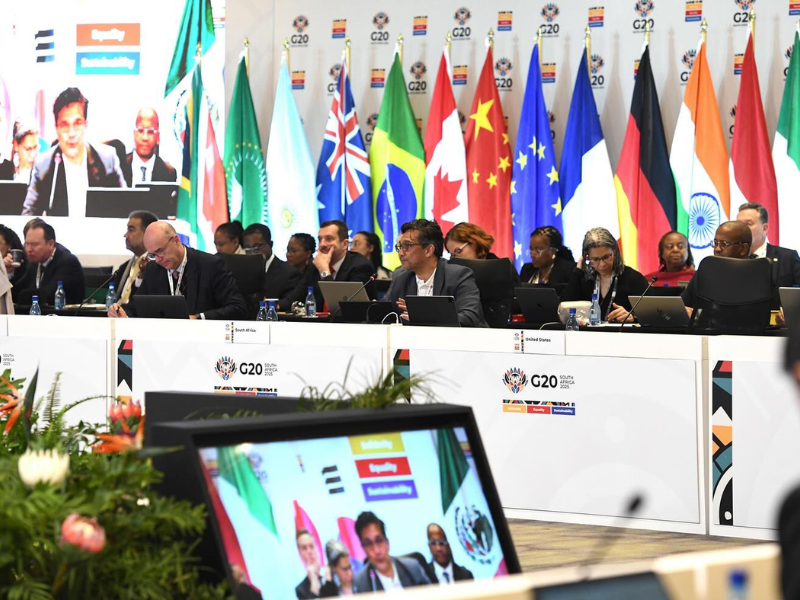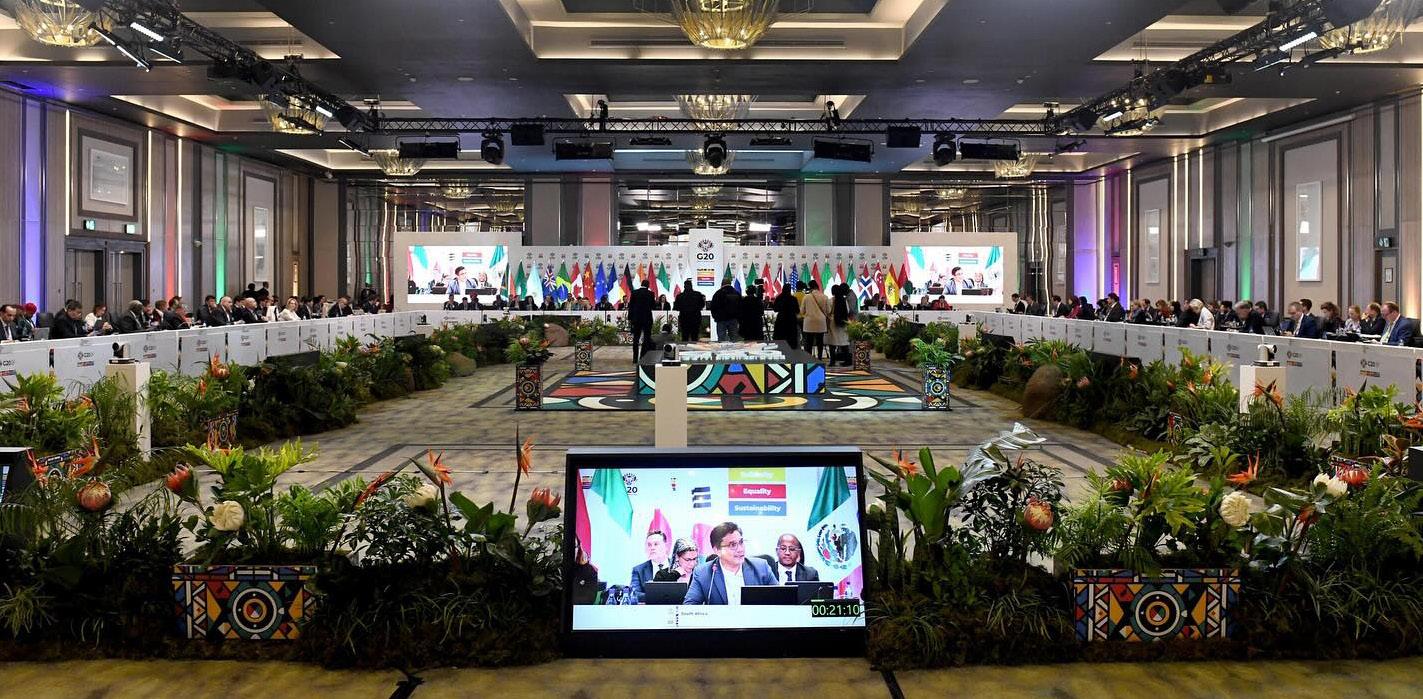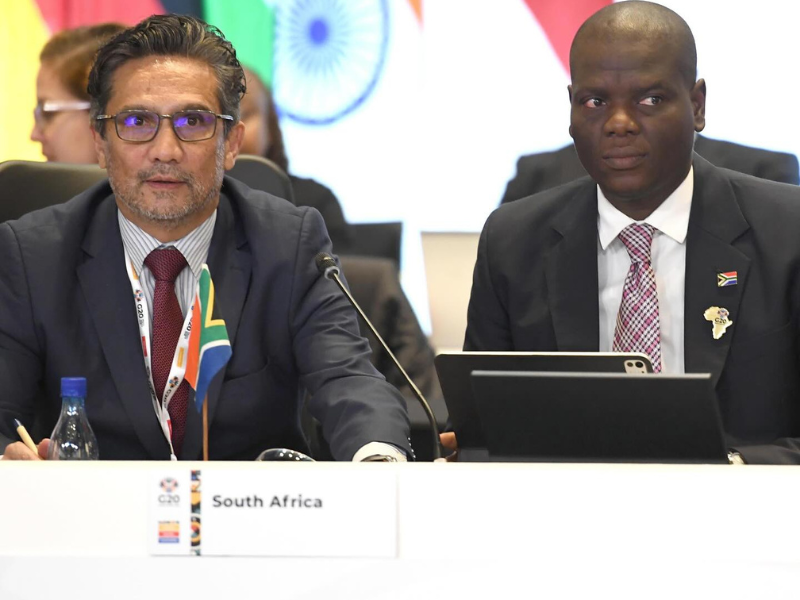
6 minute read
G20 Update - SA's Presidency At Midway Point
Evaluating Progress Made To Date
By Shumirai Chimombe
As South Africa’s Presidency of the G20 reaches its midway point, the third meeting of the G20 Sherpas took place from 25 to 27 June at the Sun City Resort in the North West Province. Minister of International Relations and Cooperation (DIRCO) Ronald Lamola participated in the high-level session where he gave a keynote address.
The Sherpas are the personal representatives of G20 leaders and their duty is to oversee negotiations and discuss the points that will form the Leaders Summit agenda and coordinate most of the work.
Ahead of the meeting, DIRCO Director-General and South Africa’s G20 Sherpa Mr Zane Dangor spoke to the department’s radio station Ubuntu Radio to outline the topics on the table for discussion. He said that the most important issue was the report back from the working groups and task teams to give the Sherpas a sense of the key issues they would need to take forward. “And where there may be areas where we need to find ways to find agreement with each other as there may be differences.”
The Sherpas would also engage in the issues of trade and look at its impact on inclusive development. There would also be a discussion on the G20 @ 20 - a road map introduced by the Presidency which outlines a high level qualitative assessment of the G20’s progress against its key commitments and targets since its inception two decades ago. Mr Dangor indicated that a review of this road map had been done by the Organisation for Economic Co-operation and Development (OECD) and other partners, and that the first set of findings would be presented at the meeting. The meeting also provided an opportunity for the Sherpas to discuss how to approach the geopolitical issues currently gripping the world. “We will provide an overview as the Presidency of what we would like to see as the approach to geopolitics and we will be testing to see if the others agree with us.”
In his opening remarks during the Sherpa meeting Mr Dangor elaborated that this approach was to be centred on the UN Charter, respect for international law and the fact that we must all be held equally accountable for this to build a more peaceful world. “We do recognise though that the G20 is a forum for international economic cooperation and we recognise that this should be the focus. But the ongoing conflicts worldwide are definitely now even more detrimental to not just peace and security but economic development and the attainment of the Sustainable Development Goals. So we will discuss it but we will also make sure it doesn’t hold us back.”
The session also planned to outline the approach to the G20 Johannesburg Leaders Declaration in November. “As Sherpas it is our responsibility in shaping this Declaration. We draft this Declaration and we have to make sure that we shape it in a way that builds on from the last few years. From our perspective what we would like to see is the achievement of the Sustainable Development Goals (SDGs) and other common challenges. The 2030 agenda for sustainable development is at a crucial juncture and the G20’s collective influence and resources are more vital than ever to get them back on track.
“The Leaders’ Declaration should reinforce the commitment to strong sustainable, balanced and inclusive growth as a fundamental driver for the success of the SDGs with a specific focus on reducing inequalities. Again as Sherpas we must ensure that the Declaration outlines concrete and collective actions. We want it to have measurable targets where possible and not only aspirational statements.”
He thanked all the Sherpas’ delegations for their overwhelming support for the working groups and task teams, saying that this was vital as the G20 is consensus based. It’s based on discussion and it’s only through that dialogue where better understanding can be built - and better understanding can lead to agreements.
“The concrete proposals and recommendations we receive from all your delegations are invaluable. They have contributed towards strengthening our presidency and thereby ensuring that our final outcome will be robust, but importantly, inclusive, and will reflect the perspectives from all of us. So this level of engagement augurs well for achieving meaningful progress on the priorities our President has set out.”
Some of these priorities are strengthening disaster resilience and response; ensuring debt sustainability for low-income countries; mobilising finance for a just energy transition; and harnessing critical minerals for inclusive growth and sustainable development.
Promoting digital inclusion - the third G20 Digital Economy Working Group (DEWG)
The Department of Communications and Digital Technologies (DCDT) convened the third G20 Digital Economy Working Group (DEWG) meeting from 9 to 11 June 2025 in Polokwane, Limpopo Province. The meeting brought together digital economy and AI experts to reflect on the progress made toward the deliverables on key priorities agreed to at the last two meetings. These included digital public infrastructure, digital skilling, cybersecurity, and the integration of AI in the digital economy.
The Meeting Focused On Four Key Themes:
• Connectivity for inclusive digital development: A draft framework was unveiled to promote universal and equitable digital inclusion. Discussions addressed barriers to access, policy innovation, and financing for digital statistics collection to better understand and address connectivity gaps.
• Digital public infrastructure (DPI): With emphasis on its role in promoting transparency, accountability, and efficiency in government services.
• Digital innovation ecosystems for micro, small, and medium enterprises (MSMEs): Discussions were focused on the empowerment of MSMEs and youth through inclusive innovation ecosystems, addressing barriers such as limited access to capital and technology.
• Equitable, inclusive Artificial Intelligence (AI): Discussions centred on the ethical use of AI and regulatory approaches with a view to establishing frameworks to mitigate the risks posed by easily accessible deepfakes.
The outcomes of the Limpopo meeting will feed into the agenda for the G20 Digital Economy Ministers’ Meeting in September 2025.

Upcoming Events - July
2-3 July: 3rd Education Working Group Meeting
2-4 July: 3rd Empowerment of Women Working Group Meeting
7-8 July: 2nd Deputies virtual drafting session
8-9 July: 5th Health Working Group Meeting
9-10 July: 3rd Disaster Risk Reduction Working Group Meeting
9-10 July: 4th Meeting of Task Force 1: Inclusive Economic Growth, Industrialisation, Employment, and Reduce Inequality
14-18 July: 4th G20 Finance and Central Bank Deputies and Finance Ministers and Central Bank Governors’ Meetings
14-18 July: 2nd Climate and Environment Sustainability Working Group Meeting
21-23 July: 4th Development Working Group Meeting
24-25 July: Development Working Group Ministerial Meeting
28-29 July: 4th Employment Working Group Meeting
28-29 July: 3rd Culture Working Group Meeting
28-29 July: L20 Summit
29-1 Aug: 3rd Energy Transitions Working Group Meeting
29-31 July: 3rd Trade and Investment Working Group Meeting
30-31 July: Employment Working Group Ministerial Meeting

Stay updated on G20 South Africa activities, events, videos during the year:
Website: https://g20.org/
Social media: G20 South Africa on Facebook, Instagram, X, Tik Tok, Linkedin, YouTube and Flickr
Sources: G20 South Africa | DIRCO | Government of South Africa | SABC News

